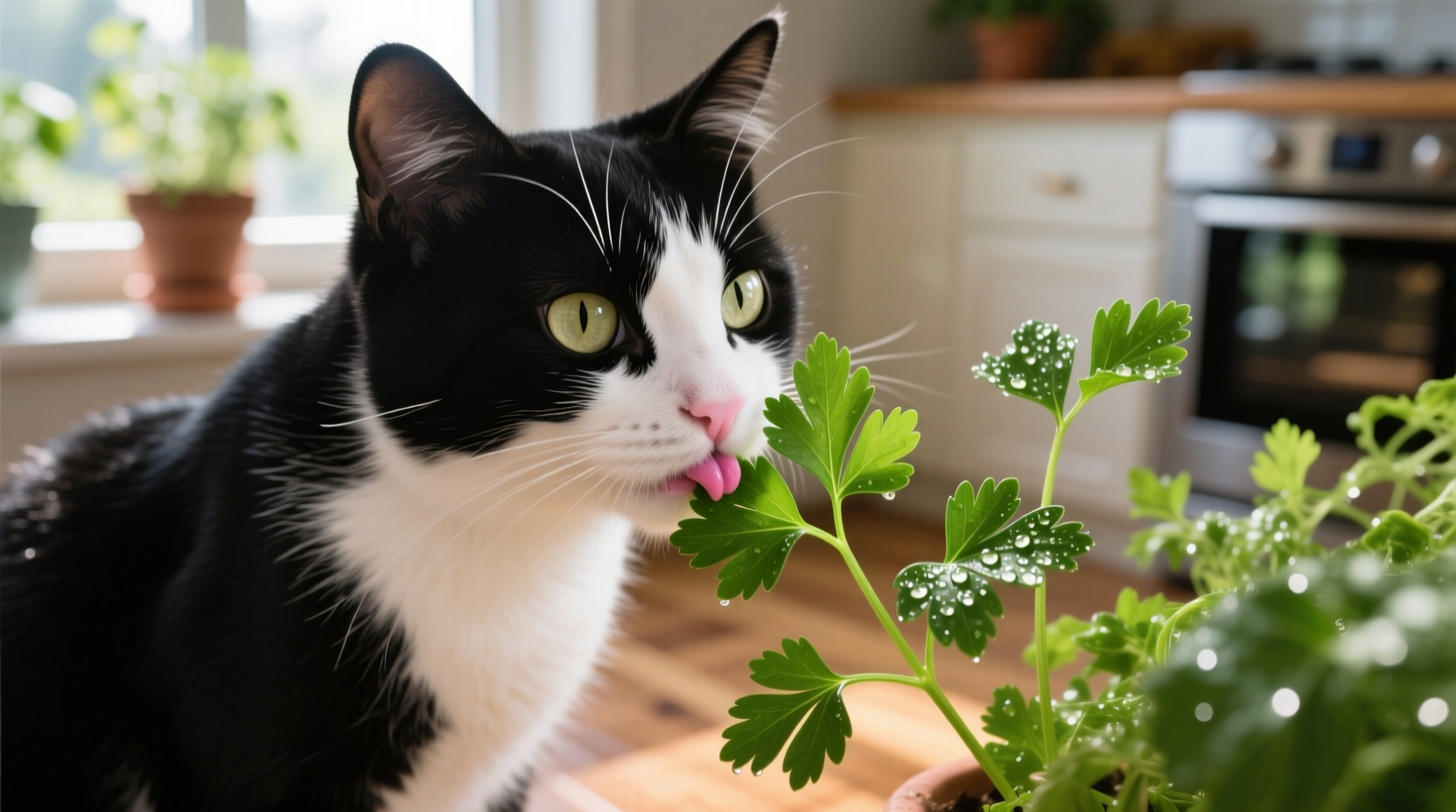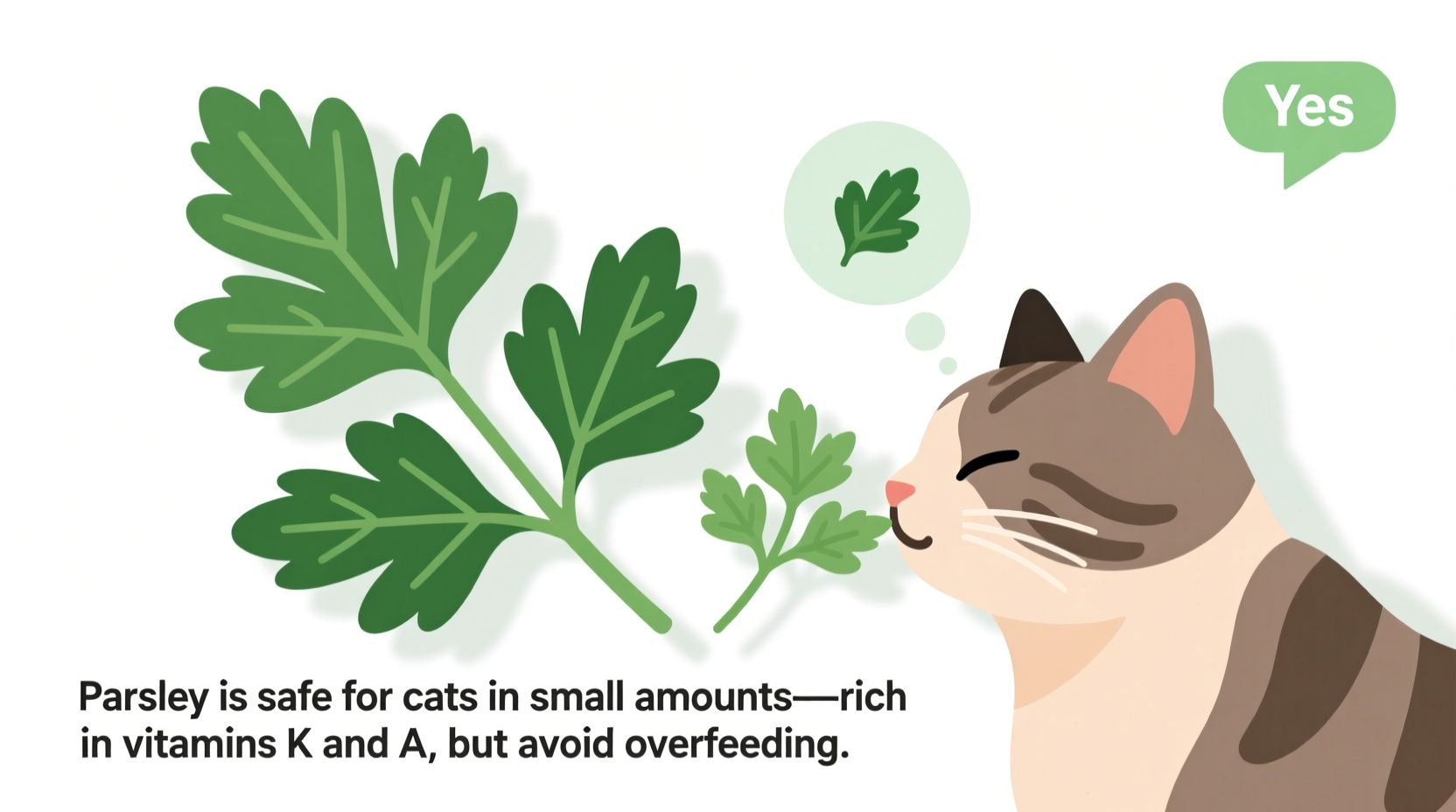Yes, parsley is generally safe for cats in small amounts. According to the ASPCA Animal Poison Control Center, parsley (Petroselinum crispum) is non-toxic to cats and can even provide some health benefits when offered as an occasional treat. However, excessive consumption may cause digestive upset, and certain preparations like parsley tea or essential oils should be avoided.
Why Cat Owners Are Asking About Parsley Safety
As more pet parents explore natural supplements for their feline companions, common kitchen herbs like parsley have gained attention. With cats' curious nature leading them to nibble on household plants, understanding which greens are safe becomes essential for responsible pet care. Recent trends in holistic pet nutrition have prompted many cat owners to investigate whether this common herb can be a healthy addition to their pet's diet.
Understanding Parsley's Nutritional Profile for Cats
Unlike obligate carnivores such as dogs, cats have specific nutritional requirements that primarily come from animal sources. However, small amounts of certain plants can complement their diet. Parsley contains several nutrients that may benefit cats when offered in moderation:
- Vitamin K: Supports healthy blood clotting
- Vitamin C: Acts as an antioxidant
- Folate: Contributes to cellular function
- Beta-carotene: Converts to vitamin A
- Chlorophyll: May support fresh breath
According to research published in the Journal of Feline Medicine and Surgery, cats can safely metabolize small quantities of plant material, though their digestive systems aren't designed to process large amounts of vegetation.
| Nutrient | Benefit for Cats | Safe Amount |
|---|---|---|
| Vitamin K | Supports blood clotting | Trace amounts |
| Vitamin C | Antioxidant properties | Minimal contribution |
| Chlorophyll | Freshens breath | Small sprigs |
| Fiber | Aids digestion in moderation | 1-2 leaves daily |
When Parsley Becomes Problematic for Cats
While fresh parsley is generally safe, certain conditions can make it problematic. The ASPCA notes that some cats may experience digestive upset if they consume large quantities. More importantly, specific preparations of parsley pose greater risks:
Unsafe Parsley Preparations
- Parsley essential oil - Highly concentrated and potentially toxic
- Parsley tea - Concentrated form may cause digestive issues
- Wild parsley varieties - Some look-alike plants are toxic
- Parsley treated with pesticides - Chemical residues can be harmful
Safe Ways to Offer Parsley to Your Cat
If you'd like to introduce parsley to your cat's diet, follow these veterinarian-recommended guidelines:
- Start with tiny amounts - Offer just one or two fresh leaves
- Wash thoroughly - Remove any pesticide residues
- Chop finely - Makes it easier to digest
- Monitor for reactions - Watch for vomiting or diarrhea
- Limited frequency - No more than 1-2 times weekly
Many cat owners find success by growing a small pot of organic parsley specifically for their pets. This "cat grass" alternative provides a safe outlet for their natural grazing behavior. The American Association of Feline Practitioners confirms that occasional plant nibbling is normal feline behavior, though the nutritional benefits remain minimal.

Special Considerations for Vulnerable Cats
Certain feline populations require extra caution when introducing any new food item:
- Kittens - Developing digestive systems are more sensitive
- Senior cats - May have compromised kidney function
- Cats with kidney disease - High vitamin K content requires veterinary approval
- Pregnant cats - Large amounts may stimulate uterine contractions
The Cornell Feline Health Center advises that cats with pre-existing medical conditions should only consume parsley under veterinary supervision. For most healthy adult cats, however, small amounts pose minimal risk.
Parsley vs. Other Common Household Plants
Many cat owners don't realize that while parsley is safe, numerous common household plants are toxic. Understanding these distinctions is crucial for pet safety:
- Safe options: Catnip, cat grass, wheatgrass, rosemary (in small amounts)
- Moderately toxic: Aloe vera, chives, garlic, onion
- Highly toxic: Lilies, sago palm, azalea, tulips
The ASPCA maintains a comprehensive database of toxic and non-toxic plants for cats, which has been updated regularly since 2003 based on veterinary case reports and toxicology research. Their data shows parsley consistently appears in the non-toxic category across multiple evaluations.
Recognizing Adverse Reactions to Parsley
While rare, some cats may experience negative reactions to parsley. Monitor your cat for these symptoms after introducing any new food:
- Excessive vomiting or diarrhea (more than 24 hours)
- Loss of appetite lasting beyond 24 hours
- Unusual lethargy or weakness
- Excessive drooling
- Skin irritation around mouth
If your cat displays any concerning symptoms after consuming parsley, contact your veterinarian immediately. Most reactions are mild and resolve within 24 hours with supportive care, but professional guidance is always recommended.
Alternative Safe Herbs for Cats
If your cat doesn't take to parsley or you'd like to offer variety, several other herbs are considered safe in moderation:
- Catnip (Nepeta cataria) - Causes temporary euphoria in most cats
- Valerian root - Similar effect to catnip for some cats
- Wheatgrass - Popular digestive aid
- Rosemary - Safe in small amounts, may repel fleas
Remember that all herbs should be offered as occasional treats, not dietary staples. The Association of American Feed Control Officials (AAFCO) emphasizes that commercial cat foods provide complete nutrition, and plant matter should never replace balanced feline diets.
When to Consult Your Veterinarian
Before making any significant changes to your cat's diet, including adding herbs like parsley, consult with your veterinarian. This is especially important if your cat has:
- Pre-existing kidney conditions
- Digestive sensitivities
- Is currently taking medication
- Has shown previous food sensitivities
Veterinary nutritionists can provide personalized guidance based on your cat's specific health profile and dietary needs. Many clinics now offer nutritional consultations as part of comprehensive wellness care.











 浙公网安备
33010002000092号
浙公网安备
33010002000092号 浙B2-20120091-4
浙B2-20120091-4